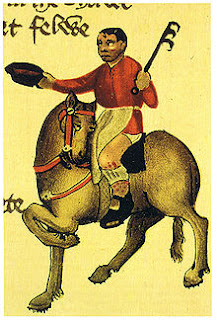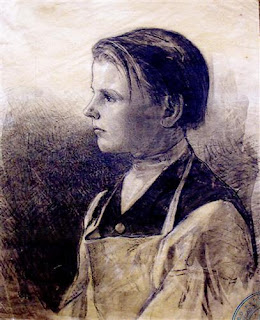The Cook makes some amusing comments about The Reeve’s Tale and then claims that he will relate a tale that happened in their city. The Host encourages him to start, but tells him that he must tell a good story to make up for all the bad food that he’s sold them. The Cook responds in kind, revealing that his tale will be about an innkeeper.
 |
| The Cook |
The Cook’s Tale
A gay, jovial, black-haired apprentice named Perkin Reveler, loves flirting and drink and dancing. And although Perkin is generous in his expenditures, his master often finds his cash-box empty and concludes:
“For certainly with an apprentice reveler
Who haunts dice, wild times, or making out
His master shall pay for it in his shop
Though he had no part in the partying
For theft and wild times are interchangeable
However much he knows how to play the cittern or fiddle
Revel and social integrity, especially in low ranks,
Are always at odds with one another, as men may see …”
or in Middle English:
“For sikerly a prentys revelour
That haunteth dys, riot, or paramour,
His maister shal it in his shoppe abye,
Al have he no part of the mynstraleye
For thefte and riot, they been convertible
Al konne he pleye on gyterne or ribible,
Reve and trouthe, as in a lowe degree,
They have ful wrothe al day, as men may see ….”
Mindful of Perkin’s tricks, his master releases him from his apprenticeship, and the young man decides to move in with his friend, who has similar vices, and his wife, who makes her living on her back, shall we say.
 |
| Apprentice Orest Kiprensky source Wikiart |
Although Chaucer only wrote 58 lines of The Cook’s Tale, and then left it incomplete, we can already see the form of the tale developing like the previous ones. After the noble Knight’s Tale, the stories have become gradually more and more humorously coarse and indecorous. Who else will the apprentice deceive, and what effect will his disreputable friends have on his already well-developed vices?
Here ends the first fragment of tales. From now on, the order of tales can vary, depending on which manuscript your particular translator chose to rely. Because we’re going by Thomas Tyrwitt’s ordering of the fragments (more information on the different manuscripts here), the next tale will be the The Man of Law’s Tale or The Lawyer’s Tale ……
The Reeve’s Tale
The Cook’s Tale
The Man of Law’s Tale
The Wife of Bath’s Tale
The Friar’s Tale
The Summoner’s Tale
The Clerk’s Tale
The Merchant’s Tale
The Squire’s Tale
The Franklin’s Tale
The Physician’s Tale
The Pardoner’s Tale
The Shipman’s Tale
The Prioress’s Tale
The Tale of Sir Thopas
The Tale of Melibee
The Monk’s Tale
The Nun’s Priest’s Tale
The Cook’s Tale
The Man of Law’s Tale
The Wife of Bath’s Tale
The Friar’s Tale
The Summoner’s Tale
The Clerk’s Tale
The Merchant’s Tale
The Squire’s Tale
The Franklin’s Tale
The Physician’s Tale
The Pardoner’s Tale
The Shipman’s Tale
The Prioress’s Tale
The Tale of Sir Thopas
The Tale of Melibee
The Monk’s Tale
The Nun’s Priest’s Tale



I would love to know how this one was going to end…. guessing is fun though 🙂
Perhaps one day they'll find a new manuscript with the complete story ……! Wishful thinking, huh? 🙂